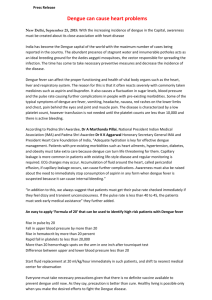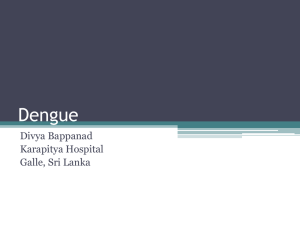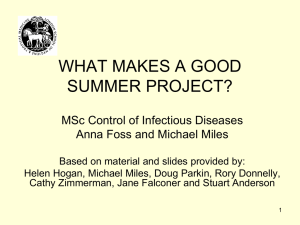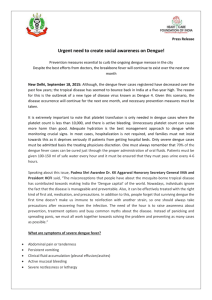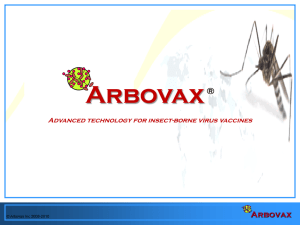2014-01-09-RRA-Blood donor screening
advertisement
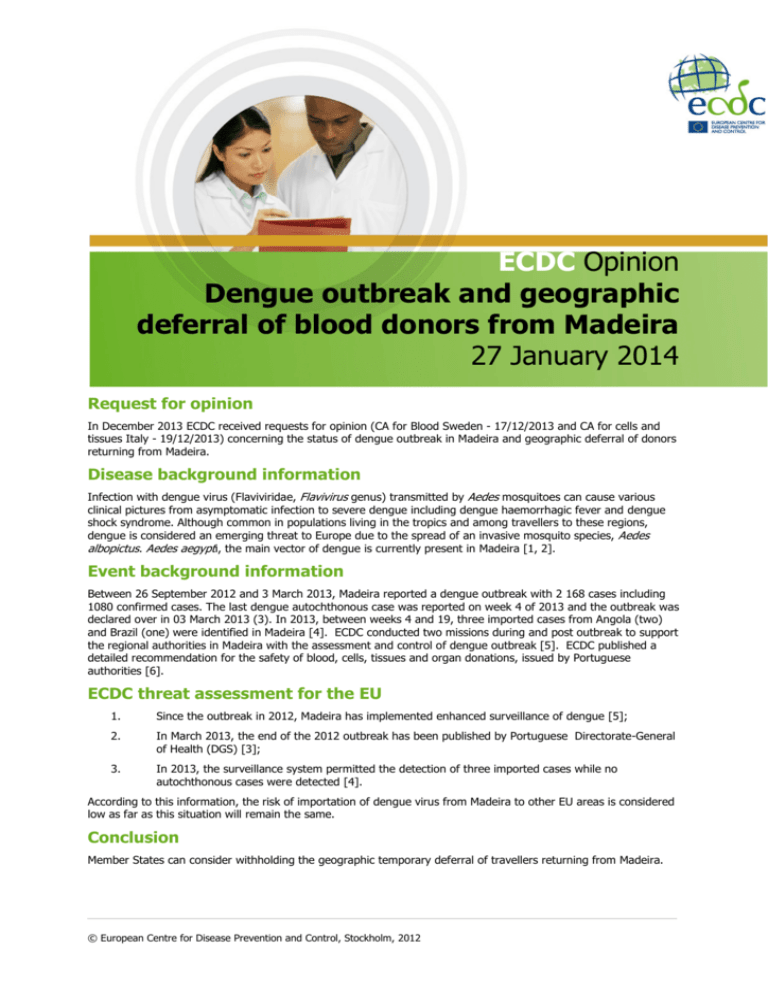
ECDC Opinion Dengue outbreak and geographic deferral of blood donors from Madeira 27 January 2014 Request for opinion In December 2013 ECDC received requests for opinion (CA for Blood Sweden - 17/12/2013 and CA for cells and tissues Italy - 19/12/2013) concerning the status of dengue outbreak in Madeira and geographic deferral of donors returning from Madeira. Disease background information Infection with dengue virus (Flaviviridae, Flavivirus genus) transmitted by Aedes mosquitoes can cause various clinical pictures from asymptomatic infection to severe dengue including dengue haemorrhagic fever and dengue shock syndrome. Although common in populations living in the tropics and among travellers to these regions, dengue is considered an emerging threat to Europe due to the spread of an invasive mosquito species, Aedes albopictus. Aedes aegypti, the main vector of dengue is currently present in Madeira [1, 2]. Event background information Between 26 September 2012 and 3 March 2013, Madeira reported a dengue outbreak with 2 168 cases including 1080 confirmed cases. The last dengue autochthonous case was reported on week 4 of 2013 and the outbreak was declared over in 03 March 2013 (3). In 2013, between weeks 4 and 19, three imported cases from Angola (two) and Brazil (one) were identified in Madeira [4]. ECDC conducted two missions during and post outbreak to support the regional authorities in Madeira with the assessment and control of dengue outbreak [5]. ECDC published a detailed recommendation for the safety of blood, cells, tissues and organ donations, issued by Portuguese authorities [6]. ECDC threat assessment for the EU 1. Since the outbreak in 2012, Madeira has implemented enhanced surveillance of dengue [5]; 2. In March 2013, the end of the 2012 outbreak has been published by Portuguese Directorate-General of Health (DGS) [3]; 3. In 2013, the surveillance system permitted the detection of three imported cases while no autochthonous cases were detected [4]. According to this information, the risk of importation of dengue virus from Madeira to other EU areas is considered low as far as this situation will remain the same. Conclusion Member States can consider withholding the geographic temporary deferral of travellers returning from Madeira. © European Centre for Disease Prevention and Control, Stockholm, 2012 OPINION Dengue outbreak and geographic deferral…January 2014 References 1. European Center for Disease prevention and control. Factsheet for health professionals. Dengue fever. Available from: http://ecdc.europa.eu/en/healthtopics/dengue_fever/factsheet-for-healthprofessionals/Pages/Factsheet_health_professionals.aspx 2. World Health Organization (WHO). Dengue: guidelines for diagnosis, treatment, prevention and control. Geneva: WHO; 2009. WHO/HTM/NTD/DEN/2009.1. Available from: http://whqlibdoc.who.int/publications/2009/9789241547871_eng.pdf 3. http://www.dgs.pt/ficheiros-de-upload-2013/dengue-madeira-situacao-em-2013_03_03.aspx 4. http://www.dgs.pt/ficheiros-de-upload-2013/dengue-madeira-situacao-em-2013_05_19.aspx 5. European Center for Disease prevention and control. ECDC supports Madeiran and Portuguese authorities with dengue outbreak: mission report Available from: http://ecdc.europa.eu/en/publications/Publications/dengueoutbreak-madeira-mission-report-nov-2012.pdf 6. European Center for Disease prevention and control. Rapid Risk Assessment. Autochthonous dengue cases in Madeira, Portugal. 10 October 2012. Available from:http://ecdc.europa.eu/en/publications/Publications/Dengue-Madeira-Portugal-risk-assessment.pdf 2 OPINION Dengue outbreak and geographic deferral…January 2014 3
